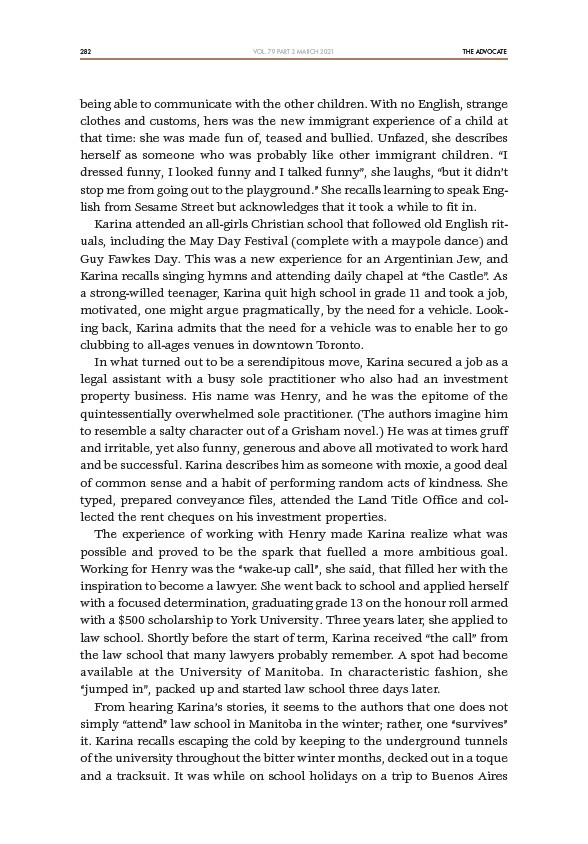
282 THE ADVOCATE
VOL. 79 PART 2 MARCH 2021
being able to communicate with the other children. With no English, strange
clothes and customs, hers was the new immigrant experience of a child at
that time: she was made fun of, teased and bullied. Unfazed, she describes
herself as someone who was probably like other immigrant children. “I
dressed funny, I looked funny and I talked funny”, she laughs, “but it didn’t
stop me from going out to the playground.” She recalls learning to speak English
from Sesame Street but acknowledges that it took a while to fit in.
Karina attended an all-girls Christian school that followed old English rituals,
including the May Day Festival (complete with a maypole dance) and
Guy Fawkes Day. This was a new experience for an Argentinian Jew, and
Karina recalls singing hymns and attending daily chapel at “the Castle”. As
a strong-willed teenager, Karina quit high school in grade 11 and took a job,
motivated, one might argue pragmatically, by the need for a vehicle. Looking
back, Karina admits that the need for a vehicle was to enable her to go
clubbing to all-ages venues in downtown Toronto.
In what turned out to be a serendipitous move, Karina secured a job as a
legal assistant with a busy sole practitioner who also had an investment
property business. His name was Henry, and he was the epitome of the
quintessentially overwhelmed sole practitioner. (The authors imagine him
to resemble a salty character out of a Grisham novel.) He was at times gruff
and irritable, yet also funny, generous and above all motivated to work hard
and be successful. Karina describes him as someone with moxie, a good deal
of common sense and a habit of performing random acts of kindness. She
typed, prepared conveyance files, attended the Land Title Office and collected
the rent cheques on his investment properties.
The experience of working with Henry made Karina realize what was
possible and proved to be the spark that fuelled a more ambitious goal.
Working for Henry was the “wake-up call”, she said, that filled her with the
inspiration to become a lawyer. She went back to school and applied herself
with a focused determination, graduating grade 13 on the honour roll armed
with a $500 scholarship to York University. Three years later, she applied to
law school. Shortly before the start of term, Karina received “the call” from
the law school that many lawyers probably remember. A spot had become
available at the University of Manitoba. In characteristic fashion, she
“jumped in”, packed up and started law school three days later.
From hearing Karina’s stories, it seems to the authors that one does not
simply “attend” law school in Manitoba in the winter; rather, one “survives”
it. Karina recalls escaping the cold by keeping to the underground tunnels
of the university throughout the bitter winter months, decked out in a toque
and a tracksuit. It was while on school holidays on a trip to Buenos Aires